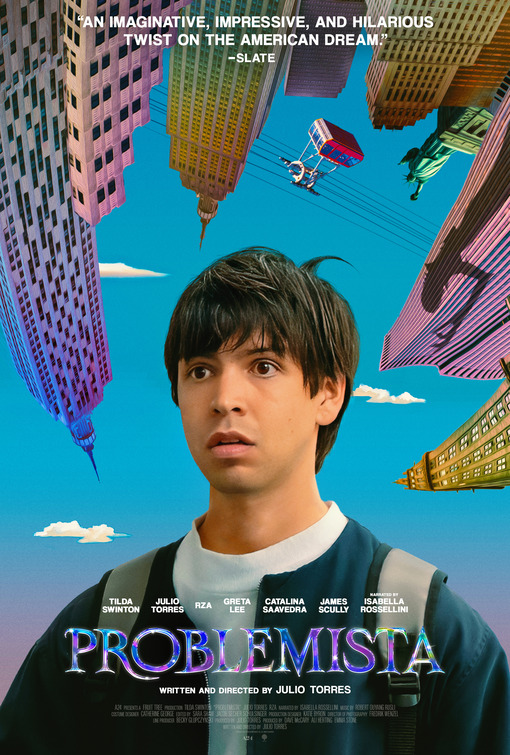
⭐⭐⭐
Rating: 3 out of 5.Prepare for a whimsical journey through the immigrant experience. In Problemista (Spanish for troublemaker), the difficulty of navigating various bureaucratic hurdles takes an unexpected turn into magical realism. Writer and director Julio Torres challenges our expectations with a fairytale atmosphere. Isabella Rossellini contributes to this feeling with an intermittent voice-over as the narrator.
The story is unpredictable. Julio Torres also stars as Alejandro, a young dreamer from El Salvador. From his early years, he has fostered a close bond with his imaginative mother, Dolores (Catalina Saavedra), an artist. Now settled in Bushwick, Brooklyn, Alejandro harbors aspirations of becoming a toy developer for Hasbro. However, his dreams face a setback as the company denies his application, jeopardizing his stay in the U.S. on a work visa.
To pay the rent, he accepts a job at FreezeCorp, a company that puts sick people into a cryogenic sleep with the hope of being revived and cured in the future. Unfortunately, he is fired for accidentally unplugging the chamber for client Bobby Asencio (RZA). However, this introduces him to his demanding wife, Elizabeth (Tilda Swinton). They strike up a friendship. She hires him as her assistant and is tasked with organizing Bobby’s artwork for an upcoming show. Alejandro will navigate challenges, including financial struggles and cultural barriers, all while seeking sponsorship to stay in the country. As Alejandro’s quest unfolds, he learns valuable lessons about how to stand up for himself.
To appreciate the humor, you have to be on board with Julio Torres’ off-kilter mindset. Alejandro’s unique toy concepts include a Barbie with one hand behind her back and fingers crossed (she’s intriguing), a broken Slinky that insists the owner take the walk themselves, and a Cabbage Patch doll with a cellphone that makes assorted Venmo charges. Meanwhile, the classifieds website Craigslist is portrayed as a flamboyant human (Larry Owens). These concepts are funny because they are bizarre but they lack genuine insight. That describes most of the humor in the film. Other targets include the bureaucratic red tape and catch-22 situations that dot the residency process.
The narrative is centered on two main oddballs. Alejandro’s youthful countenance suggests actor Justin Long’s brother from Central America. He lacks confidence, his posture slumped, and his steps hesitant, shuffling along with a sense of resignation. His curiously insincere responses to every question is “Uh, no” and “Oh wow” to statements that demand some reaction. Meanwhile, Art critic Elizabeth (Tilda Swinton) is a Karen to the 10th power. “Always send food back,” she recommends. “I’ve been waiting a VERY long time,” she angrily states to one waiter minutes after entering a cafe and “Why are you SCREAMING at me?” to anyone who calmly explains something to her dissatisfaction. A magenta dish rag of hair hangs down over her eyes while clutching an iPhone with the flashlight perpetually on.
Torres respects his human characters, which could have been lampooned as parody. Alejandro’s immigration lawyer, Khalil (Laith Nakli), would be an object of ridicule in any other iteration. Here, he is supportive and even offers to hire the guy. Elizabeth’s domineering personality makes her disliked by everyone—everyone that is except Alejandro, who cherishes her. Elizabeth inspires Alejandro to channel his inner white woman and ultimately stand up for himself.
Julio Torres’ condemnation of the immigration system is unique. That’s a recommendation of sorts. He first made a name for himself as a writer on Saturday Night Live, where short films like “Papyrus,” “Wells for Boys,” and “The Sink” spun existential premises into viral comedy. Next up was the HBO comedy series Los Espookys, where he was the co-creator, writer, and executive producer. This is his semi-autobiographical filmmaking debut, and it continues his fascination with whimsy and hallucinations. Directors Wes Anderson and Michel Gondry would appear to be influences. However, unlike those established talents, his inexperience shows.
Most of this surrealist fantasy comes across as a muddled presentation rather than a coherent takedown of a problematic system. The experimental ideas are less focused and rarely produce laughs. The underlying sadness, which could have elicited a more emotional connection, gives way to absurdist touches that produce a lot of things that make you go, Huh? Nevertheless, the melancholy mood is appealing, and the ideas are unique enough to warrant attention. While the film may not always hit its mark, its inventive storytelling and heartfelt love for its characters leave a lasting impression. Audiences will likely ponder the immigrant experience in ways they never expected.
04-02-24

